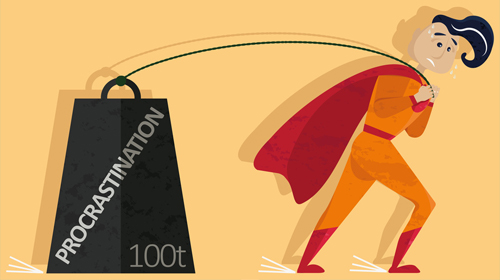It might seem like a harmless distraction, but procrastination can limit your life chances and be detrimental to your health. We explain what it is, and how to get to grips with it. Plus seven ways to stop procrastinating.
We all put off the things we have to do sometimes. Distractions are horribly easy to find especially in the age of smart phones, but 20 per cent of people chronically avoid difficult tasks by deliberately looking for distractions. And chronic procrastination is self-sabotage.
However, as with most things, with a little effort, once you understand your procrastination, you can overcome it.
Why do we procrastinate?
Procrastination often comes as part of our ever-lasting struggle with self-control and discipline. We put off our tasks and set aside our goals because it is hard to make ourselves do things when we don’t feel like it or have an idea we might do it better if we did it tomorrow.
But it is not only a sign of lack of self-discipline. It could just be a simple case of being highly impulsive or easily distracted. As in the following scenario: “Oh it only takes a minute to look at a text, check my email, or look at Facebook… Oops, where did the morning go?” Or it could be a by-product of perfectionism. And a case that you find it more psychologically acceptable to avoid doing something rather than have to face the possibility of not doing it well or ‘perfectly’.
Some repeat procrastinators will claim that they need a deadline to make the creative juices flow and that they perform better under pressure, but this is not really (or necessarily) true and is most likely just a way of justifying putting things off.
How is it self-sabotage?
You want to, say, write an essay for college or a report for work because you need to do it to progress, and it is an achievement you would really value. However, cleaning the grout in the shower suddenly becomes the thing you have to do? Does this really matter if you manage to finish the essay or report, plus you have a sparkling bathroom, isn’t that win-win? No, because procrastination is what happens in the gap between intention and action.
The dirty little secret is that procrastinators distract themselves as a way of regulating their own emotions, such as fear of failure. And not closing the gap between ‘what I intend to do’ and ‘what I actually do’ is undermining. You have sabotaged your own well-laid plans and that allows self-doubt to enter and a negative internal dialogue to begin: ‘Why am doing B when I should be doing A?’ Is a close cousin to ‘Why am I so useless?’
Procrastination means you delay ‘acting’ or ‘doing’ longer than you know you should. In the case of chronic procrastinators, more time is wasted than can afford to be wasted. One could wind up wasting one’s whole life.
Putting things off is also bad for your health and your wider system. It raises stress levels and sends stress hormones coursing through your body, this can keep you awake at night and wear your system out faster. It also puts you at risk because you have set up a pattern of putting off important things and so you are as likely to delay seeking medical help, as you are to delay everything else.
Recent research shows that procrastination actually weakens your immune system. It can also be disruptive in your relationships and make your loved ones resentful, because it can shift the burden of responsibilities onto them.
The good news, though, is that procrastination is a ‘learned’ behaviour so you can unlearn it.
How do you stop procrastinating?
- TUNE IN TO THE SIGNS. The moment you think “I’ll feel more like doing this later” or “I work better under pressure,” recognise that you’re just about to procrastinate and… stop yourself. Resist the urge.
- DON’T THINK TOO FAR AHEAD. Break the task down into smaller parts and aim for a little progress at a time. Research shows that having a low threshold fuels motivation and helps you to see the task as more achievable.
- DOUBLE YOUR TIME. Try to accurately work out how much time you think it will take you to complete a task. Then increase the estimate by 100%.
- AVOID THE CUES. Think about the easy diversions — social media, that pesky grout, etc — and make what the psychologists call a pre-decision to resist giving in to that temptation. So that when tempting situation X threatens to take your attention away from the task in hand, you don’t have to rely on further thought and planning.
- ELIMINATE THE MENACE. If the above doesn’t work tell someone to remove your phone from you or block yourself from Facebook temporarily.
- ADOPT A HEALTHY DOSE OF REALISM. Sometimes, however much you think you want to (or ought to) do it, a task is not achievable or even desirable. So, be honest! And eliminate the tasks you probably never really intended to do.
- RECOGNISE THE ENEMY WITHIN and you’ll be able to move forward to doing what you intended, and becoming the person you want to be.
If you would like to get to grips with your tendency to procrastinate, or talk about a self-sabotaging pattern, we have a team of counsellors who will be able to help. Call 020 8673 4545 or email [email protected] for a confidential appointment.







